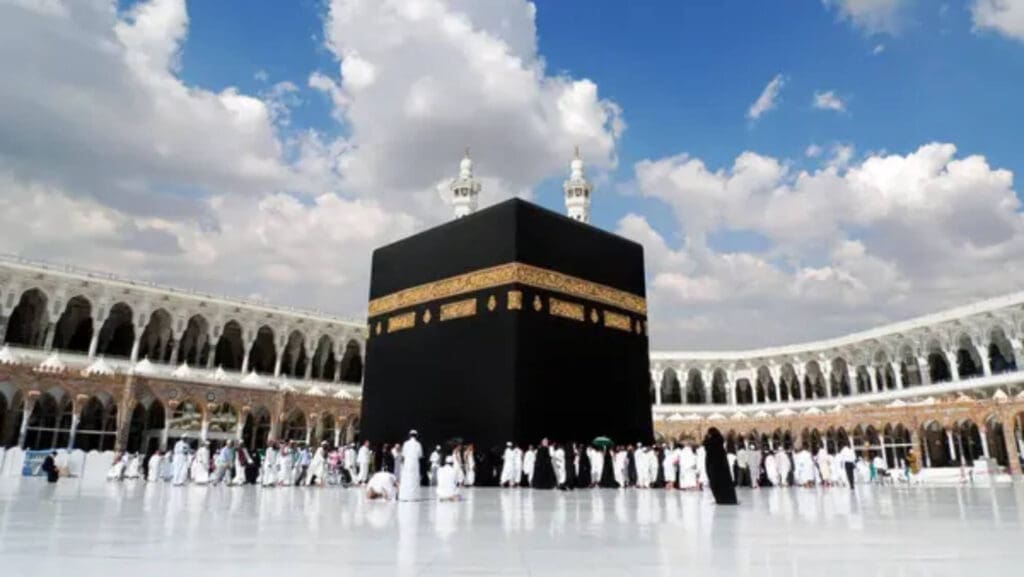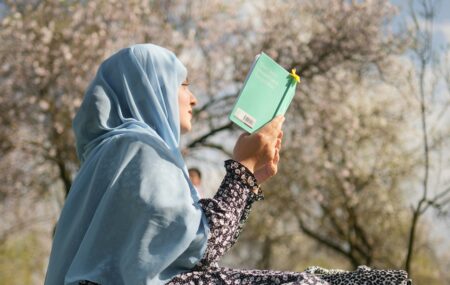
Embracing Menstruation During Holy Months: Staying Connected to Faith
My dear sister, if you’ve ever felt a pang of sadness or a sense of exclusion during sacred times like Ramaḍān or Dhul Ḥijjah because of your period, know that you are not alone. It’s natural to feel this way. Your heart longs to pray, fast, and engage in worship, especially on blessed days like the Day of ‘Arafah or Laylat al-Qadr.
This feeling of loss and exclusion is not new. Our beloved mother of the believers, ‘Aisha (rA), experienced it too. Once, she had intended to perform Ḥajj, but her menstruation began. She wept. But the Prophet ﷺ reassured her with words full of wisdom and compassion :“This is a matter that Allah has decreed for the daughters of Ādam.” (Bukhārī 294)
This powerful reminder is for you, too. We firmly believe in divine decree. Just as Laylatul-Qadr is the night when fates and destinies are revealed for the coming year, your period arriving is part of Allah’s ﷻ perfect design. And that is perfectly okay. Menstruation is not a barrier to Allah’s ﷻ love or mercy; it is a natural process that reflects His wisdom. You are gifted rest during times of physical and emotional challenge, and rewarded for obeying His command in all cases. So, let’s start reframing the way you see your period! Instead of an unfortunate “end”, it’s an invitation to refocus, recharge and reconnect with your Creator, differently – through which you can still strive for spiritual excellence!
Perfecting your niyyah
“Actions are only by intentions, and every person will have only what they intended.” (Bukhārī and Muslim)
Isn’t it beautiful how Allah ﷻ rewards you simply for your sincere intention – even if you couldn’t fully carry out what you planned? Take a moment to ask Allah to grant you the complete reward for every good intention in your heart. Perhaps He has already recorded the best of what you hoped to do, freeing you to accomplish other beautiful acts of devotion. Trust that your sincere intentions have value – Allah never overlooks them.
Everyday moments – helping a loved one, preparing ifṭār, or even resting – can transform into acts of worship through your intention. Pause today, renew your niyyah, and let even your simplest actions become meaningful.
Working on the heart
While you pause outward acts like prayer, your heart remains a sanctuary for worship. Try to find solace in cultivating love, contentment, and hope in Allah’s ﷻ plan. The Prophet ﷺ taught us that a pure heart is beloved to Allah: “Allah does not look at your bodies or wealth, but He looks at your hearts and deeds.” (Muslim 2564) He also frequently supplicated, “O Changer of the hearts, make my heart firm upon Your religion.” (Tirmidhi 3522)
One powerful method to maintain a positive mindset is shukr (gratitude). Ibn al-Qayyim beautifully said, “Half of our belief (īmān) rests on practicing shukr.” Shukr can be expressed through:
- The heart : cultivate submissiveness and humility before Allah.
- The tongue: Verbally acknowledging and praising Him for His blessings.
- Our actions: Acts of obedience and devotion that reflect our gratitude.
Consider keeping a journal of your blessings, reflecting on both the obvious gifts like health, family, and career, and even the challenges that have drawn you closer to Allah ﷻ. Sometimes, the very setbacks we face are the opportunities we need to grow and strengthen our faith.
Another beautiful reminder is that Allah ﷻ is Al-Shakūr — the Appreciative. He multiplies even our smallest efforts and continuously protects us in ways we don’t see. How comforting is it to know that our acts of gratitude, however small, are noticed and rewarded by Him. Slow down and take stock of the blessings you may overlook.
Reflection time (tafakkur)
Tafakkur (reflection) is an important part of our faith. Thoughtful moments have the power to soften our hearts, nurture our souls, and bring us closer to Allah. Ibn Qayyim beautifully describes tafakkur as “increasing one’s knowledge and allowing the heart to attain what it previously did not have.”
He further explains that “Fikr is what takes a person from the death and slumber of distraction to being awake and alive. From what he hates to what he loves, from worldly dependency to worldly independence, from the prison of this world to the freedom of the next, from the constraints of ignorance to the expansion of knowledge, from the disease of desire to the cure of turning to Allah, from blindness, deafness, and dumbness to the blessings of sight, hearing, and the profound understanding of Allah, from the disease of doubts to the relief of certainty.”
Use this time to reflect on your relationship with Allah ﷻ. Today, take a gentle pause. Reflect on your personal relationship with Allah ﷻ. Notice the signs of His presence in the world around you – the beauty of nature, the wonder of the human body, and the majesty of the universe. Think about the lessons hidden within your own life experiences, and feel His endless mercy guiding you, even through challenges. Tafakkur will open the heart, deepen understanding, and lead to a renewed sense of purpose.
Immersing in the Qur’ān
“We sent down the Qur’ān as a healing and mercy for the believers…” (Qur’ān 17:82)
The Qur’ān is a timeless source of guidance, comfort, and spiritual healing. If you believe that reciting the Qur’ān for memorisation or learning is permissible during menstruation, then continue to recite and reflect upon its words. Alternatively, create a sacred space by listening to recitations that uplift your soul or delve into tafsīr (exegesis) to deepen your understanding.
We also encourage practicing taddabur (contemplation) – taking the time to ponder a verse and apply its lessons to your life. For example, the verse “My Mercy encompasses everything” (Qur’ān 7:156) reminds us that no matter how challenging life may be, we are always enveloped in Allah’s boundless mercy.
The Qur’ān is always there for you; a source of healing, inspiration, and solace at every stage of life.”
Keep your tongue moist with dhikr
Dhikr is a beautiful way to remember Allah, especially when you feel disconnected or alone. Allah promises: “Remember Me; I will remember you.” (Qur’ān 2:152)
Remembering Allah ﷻ throughout the day can bring peace to your heart. Simple utterances like SubḥānAllāh (Glory be to Allah), Alḥamdulillāh (All praise is due to Allah), or Lā ilāha illā Allāh (There is no deity but Allah) carry immense spiritual weight.
The Prophet ﷺ said: “Alḥamdulillāh fills the scale.” (Muslim: 223)
Making sincere duʿā’
Menstruation never limits your ability to make duʿā’. In fact, it’s the perfect time to pour your heart out to Allah ﷻ. He listens to every hope, tear, and whispered prayer.
The Prophet ﷺ said: “Verily, Allah is abundant in ḥayāʾ (grace and modesty) and generous. He would be shy to turn away the hands of a person who raises them to Him empty and disappointed.” (Tirmidhī: 3556)
Especially during sacred nights like Laylat al-Qadr, ask Allah ﷻ for His mercy, forgiveness, and guidance. When ʿĀʾishah (ra) asked the Prophet ﷺ what to say on Laylat al-Qadr, he taught her the beautiful duʿāʾ: “O Allah, You are Pardoning, and You love to pardon, so pardon me.” (Tirmidhī: 3513)
Choose a special place or time to make duʿāʾ, allowing your mind to quiet and your heart to open. Speak to Him as if He is near — because He is.
Seek sacred knowledge
The Prophet ﷺ said, “Whoever travels a path in search of knowledge, Allah will make easy for him a path to Paradise.” (Muslim: 2699)
Menstruation is the perfect time to enrich your soul through learning. Learning strengthens our understanding and gratitude, filling our hearts with spiritual light and our minds with clarity. Whether it’s reading Islamic books, listening to lectures, or engaging with podcasts, seeking knowledge is one of the highest forms of worship. Use this opportunity to reflect on Islamic teachings, explore tafsīr (Qur’ānic exegesis), and gain a better understanding of the dīn.
Nourish your body and rest
Your body is an amānah (trust) from Allah ﷻ, and caring for it is an act of worship. Use this time to replenish yourself through proper nutrition, hydration, and rest. Eat nourishing foods like:
- Water-rich fruits (watermelon, cucumber, strawberries) for hydration
- Bananas for potassium & mood regulation
- Leafy greens (spinach, kale) for iron & magnesium
- Fatty fish (salmon, sardines) for omega-3s & reduced inflammation
- Whole grains (oats, quinoa) to balance blood sugar
- Almonds, chia seeds & dark chocolate to ease muscle tension
- Probiotics (yogurt, fermented foods) for gut health
Try to avoid heavily processed foods, sugary snacks, and excess caffeine.
Rest is equally essential. Gentle walks, naps, and light stretches can help rejuvenate your energy. Warm baths, heating pads, and magnesium salts ease muscle tension and reduce cramps. Self-care supports your body’s natural healing process while fostering inner calm and balance.
Stay connected
If you have extra energy during Ramadān, consider using it to support others. Engaging in acts of kindness brings immense spiritual rewards and serves those around you. The Prophet ﷺ praised those who assist others – even when not fasting – saying, “Those who were not fasting today have taken all the reward.” (Bukhārī: 2890)
There are many ways to serve:
- Preparing meals for family or neighbors.
- Volunteering for community projects.
- Offering a kind word or checking in on someone in need.
- Donating to charities.
- Volunteering at the masjid.
- Helping with community clean-up efforts.
As the Qur’ān reminds us: “Those who spend their wealth in charity day and night, secretly and openly – their reward is with their Lord, and there will be no fear for them, nor will they grieve.” (Qur’ān 2:274)
Ramadān can sometimes feel lonely, especially if you’re away from family or managing demanding responsibilities. Reach out to sisters’ circles or online communities, and be welcoming to local reverts by including them in your gatherings. Every act of service, no matter how small, is a beautiful way to share blessings and uplift one another. Spiritual growth is often easier when you’re supported by others!
Final thoughts
Your connection to Allah is never broken. The acts of worship you engage in during this time — whether through dhikr, duʿā’, service, or self-care — are deeply valuable.
Menstruation is not a barrier; it is a gentle reminder of Allah’s wisdom and mercy. As you embrace these practices, know that every effort is seen, every intention rewarded, and every moment of sincerity cherished by your Creator. You are never excluded from His love. Your heart remains a vessel of devotion. Keep it filled with remembrance, gratitude, and trust in Allah’s plan, and you’ll find yourself growing ever closer to Him.

